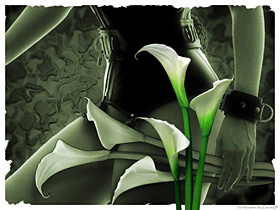 |
 |
 |
 Editorials | Environmental | March 2006 Editorials | Environmental | March 2006  
Border War
 George Ball - NYTimes George Ball - NYTimes


| | Botanical xenophobes say that a pristine natural state exists in our yards and that to disturb it is both sinful and calamitous. |
The horticultural world is having its own debate over immigration, with some environmentalists warning about the dangers of so-called exotic plants from other countries and continents "invading" American gardens. These botanical xenophobes say that a pristine natural state exists in our yards and that to disturb it is both sinful and calamitous. In their view, exotic plants will swallow your garden, your neighbors' gardens and your neighbors' neighbors' gardens until the ecosystem collapses under their rampant suffocating growth.

If anything suffocates us, though, it will be the environmentalists' narrowmindedness. Like all utopian visions, their dream beckons us into a perfect and rational natural world where nothing ever changes — a world that never existed and never will.

Native plants are the survivalists of the botanical world, and in the appropriate settings — wilderness areas, home and botanical gardens, public parks and sidewalks — they bless us with their beauty and awe us with their tenacity. Our lives would be poor and grim without the strawberry, cranberry, columbine and trillium. They've always been here, in the same way that Native Americans have been; only their arrival and settlement are more ancient.

Their presence illustrates a geologic time, about 8,000 years ago, when the glaciers receded and unimaginably vast deluges swallowed the surface of the future United States — an airplane ride over the Midwest reveals enormous lakes formed by even larger melted ice masses. As the landscape changed, the botanical world sorted itself out, leaving us with the hardy "natives." (It should be noted, though, that many plants now considered natives — like sycamores, magnolias and cinnamon — arrived from other continents, just as we did. They are products of adaptation.)

Like human survivalists, natives are also subject to exploitation by the horticultural equivalent of radical fundamentalists. The anti-exotics argue that gardens should be populated exclusively by native plants, as if the exotics were trying to enter the flower bed illegally. The consequences of such a stand could be dire. Should we eat no onions or garlic, apples or lemons; feast our eyes on no magnificent tulips or roses — all exotics of Eurasian origin? Should Asians not enjoy their distinctive peppers, tomatoes, beans, squash, sunflowers and corn — all from the Americas?

Indeed, the world's most popular root crop, potatoes, started life as a staple of the Andean people and achieved its first international fame as a slave food. By the time it reached France, the "earth apple" was a delicacy likened to truffles; their flowers were featured in tiaras of court ladies. Exotic indeed.

Should we deprive ourselves of petunias, begonias, impatiens and hollyhocks — not a one of them "native"? Must we, on pain of being cast out of the garden as horticultural pariahs, deny the elephant his peanuts? This wouldn't be merely ridiculous. It would compare with the denial of human immigration on grounds that certain ethnic groups breed in numbers "too prolific" for the existing elite to tolerate. Imagine, then, a horticultural ruling class. No "invasives" need apply: let the lily find another valley. Such prohibitions of exotic plant species demonstrate only an elitist snobbery that is as dangerous to a free society as it is to a free botany.

No one, and certainly no gardener, grows truly destructive invasive plants in his garden. The devastating kudzu in the South, star thistle in the West and purple loosestrife in the East were accidental introductions from Asia, most often mixed with the feed and bedding of livestock. Yet the pro-native, anti-exotic partisans also wish us to stop enjoying the charms of harmless and beautiful plants like Queen Anne's lace, yarrow and chicory. Aside from requiring a bit of weeding, exotics are safe as milk, unless one considers gardening a chore rather than a passionate hobby. If so, forget the forget-me-nots.

Let's welcome, as spring arrives tomorrow, as many huddled masses of flowers, herbs and vegetables as can fit in our unique melting pot of a nation, unrivaled in its tradition of lush diversity and freedom to grow rampantly.

George Ball, a former president of the American Horticultural Society, is the president of the seed and plant company W. Atlee Burpee & Company. | 
 | |
 |



